Mozilla Hub

Das HOUSE 2.0 - in Keplers Gardens
Das HOUSE von minuseins ist eine Einladung in eine so atmosphärische wie rätselhafte Zwischenwelt. Das Projekt beginnt mit einem begehbaren Teaser und öffentlichen Testlauf, später soll das Projekt als theatrale VR-Serie fortgeführt werden. Der Kern des Projekts ist dabei immer die Fragestellung: Wie geht Gemeinschaft online? Wie funktioniert digitale Kopräsenz? Was verschwindet dabei?
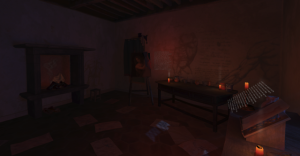
Join our VR guided tours to Leonardo da Vinci's studio
Explore Leonardo da Vinci’s studio, see artefacts from his time that capture some of the doubts we assume he had about his life and work, and learn about the concept of "doubt" during the renaissance.
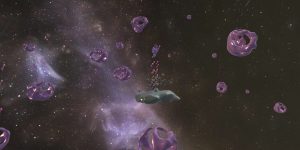
Harmony
Team Members: Clara Roth, Robbie Ierubino, Peter Sauleda, Maria Kallionpää, Kathi Schulz
Harmony fosters an inclusive atmosphere among strangers, reframing the concepts around co-creation and collaboration. Co-composing can be intimidating at times, as there is pressure to perform.
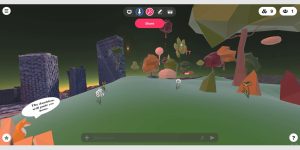
Project Home
Team Members: Esma Bosnjakovic, Max Haarich, Barbora Horská, Nicole Schanzmeier
Project Home aims to redefine this almost utopian narrative through collecting and sharing personal stories of people who relocated by choice or necessity or struggled with the traditional concept of home for any other reason. By that, we hope to inspire others to question some of the limiting beliefs and recognise their own unique way “to home”.
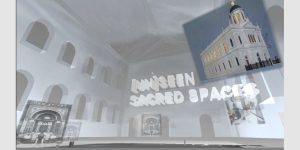
[Un]seen Sacred Spaces
Team Members: Asma Aiad, Parisa Ayati, Rebecca Merlic, Ines Mahmoud, Mateja Rot
(Un)seen Sacred Spaces is a project that deals with the (in)visibility of different sacred buildings in the cityscape. It questions why some sacred buildings are visible and others are not and why are some deliberately made invisible and what does this do to their communities?
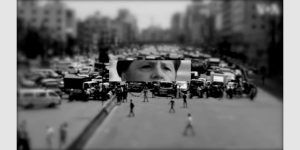
VirtualPolitik
Neo Christopher Chung
The world is at a critical junction where polarizing forces are working hard to keep us divided and troubled. We are witnessing the rise of exclusionary laws and policies, fueled by the dark side of the Internet and algorithms. Across Europe and beyond, the challenges of civil unrest and human rights are negatively affecting marginalized populations and creating intractable divisions. How can we use public platforms and new media to create inclusive outlooks and to create new political spheres?
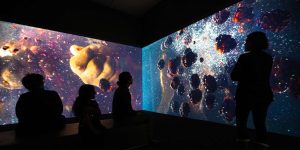
Future of Inclusion Lab
Rashin Fahandej (US)
American Arts Incubator is a creative exchange program that utilizes community-driven digital and new media art projects to instigate dialogue, build communities, bolster local economies, and further social innovation while addressing a local social or environmental challenge. This year’s iteration in Austria was led by artist Rashin Fahandej, who ran the “Future of Inclusion Lab,” a series of co-creation workshops that provided technology and resource access to Austria-based creatives.
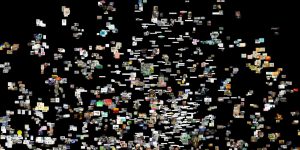
Focus:Archive
The Focus:Archive section summarizes program items that take place at the festival this year in connection with archives.
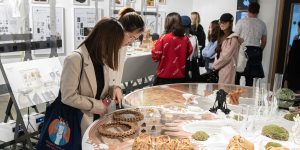
Bio-ID Hyperobject
The Bartlett School of Architecture, University College London (UK)
The main concept of the film is the creation of a design platform in form of a Hyperobject – a collection of things that overlap and intersect. It creates a system to visualise the systemic complexity of Bio-ID design research in an aesthetic and visually appealing way. The film project speculates with the idea of how data can become a visual object, a visual representation shaped into a navigational object.
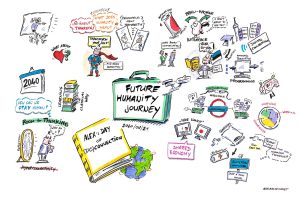
Future Humanity Journey
A day in 2040: what would our day look like in 20 years? Future Humanity Journey is an experimental workshop. Four innovators created a scenario of future humanity to better understand how humanity will develop and evolve.
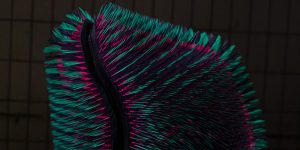
AILab
at the 2020 Ars Electronica Festival
The European ARTificial Intelligence Lab emerged from the European Digital Art and Science Network, a creative collaboration between scientific institutions, Ars Electronica and cultural partners throughout Europe that unites science and digital art. The European ARTificial Intelligence Lab takes up this theme and addresses the visions, expectations and fears that we associate with artificial intelligence.

STARTS Exhibition
Kepler's Garden on the JKU campus
STARTS is a platform aiming to foster alliances of technology and artistic practice that effectively implement European policymaking to nurture innovation and that also benefit the art world.

Breaking up the gameplay – a talk about feminism and experiencing the abolished private
Rebecca Merlic (HR)
Artist Talk about the feminist aspects of The City as a House, an interactive visual novel, an experiment of a white European 30-year-old heterosexual human, living in Tokyo without inhabiting a private apartment over a period of time.

Networked Archives
Oliver Grau (DE), Dagmar Schink (AT), Christiane Paul (DE/US), Mariano Sardón (AR), Rafael Lozano-Hemmer (MX/CA), Manuela Naveau (AT)
Panel - In a world in which we increasingly rely on online content, media art archives and platforms are no exception. The Networked Archives panel addresses their role in making media art accessible online, and highlights various approaches to the field. As archives and metadata are central issues and the base for the digital content sector they are evolving into important online value chains. How can archives be monetized, contribute to the developments in the media art markets and form base for online platforms?
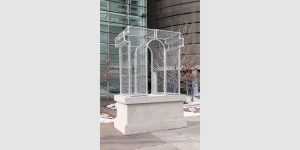
If once we ever were by Jaime Carrejo (USA)
Black Cube Nomadic Museum (USA)
Black Cube Nomadic Museums’ executive director and chief curator Cortney Lane Stell presents If once we ever were, a virtual recreation of a public sculpture and temporary monument by artist Jaime Carrejo that recognizes immigrants and their contributions to our communities. The monument is a triumphal arch composed of chain-link fencing that originally appeared in Denver, Colorado and acts as a metaphor for boundaries—the delineation of private and public space, the division of geographical borders, and the separation of rights.
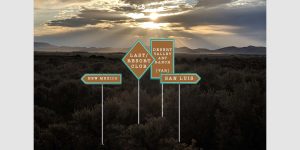
Augmented Idolatry (AI) - inaugural project of the Desert Valley Art Ranch (VAR), San Luis Valley, Colorado
LAST/RESORT Club
Augmented Idolatry (AI) is a collective AR artwork composed of seven distinct AR idols, designed in direct response to the landscape, history and spirituality of the San Luis Valley, home to the artist residency “Desert Valley Art Ranch.” An actual mud plinth built on-site is shared among the seven AR idols and connects them to the land. The AR idols refer to memento mori, indigenous histories, natural resources and sacred geometries.
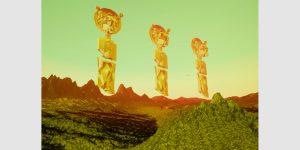
Rio Verde
Cherish Marquez (US)
Rio Verde is a socially conscious video game by Cherish Marquez that explores the healing powers of the desert, as well as themes such as Latinx iconography and mental wellness.
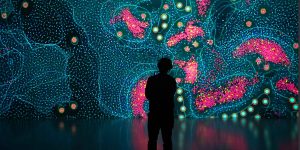
Best of Deep Space 8K
Best of Deep Space 8K offers a bilingual overview (German and English) of the highlights from the Ars Electronica Center’s regular Deep Space 8K program.
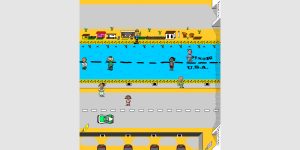
Crosser & LaMigra
Rafael Fajardo (US)
Crosser & La Migra are two video games that represent opposite perspectives on the dynamics at the US-Mexico border, rendered as early arcade graphics and presented as a diptych. Artist and designer Rafael Fajardo is the founding director of SWEAT, a loose collaborative that makes socially conscious video games in order to explore the poetics of interactivity, critique and deploy electronic media, and comment on cultural realities.

Frontera!
John Jota Leaños
Leaños directed and produced the animated documentary, Frontera!, retelling the history of the 1680 Pueblo Revolt in New Mexico. The film has been supported by a 2012 Guggenheim Fellowship in Film and Video and a National Association for Latino Arts and Culture Grant, among others. Collaborators: Conroy Chino (Acoma Pueblo), Warren Montoya (Santa Ana Pueblo, Tamaya and Santa Clara Pueblo, Khapo Owinge’), Lee Moquino (Santa Clara Pueblo, Zia Pueblo, Apache/Yaqui), Aimee Villarreal, and Cristóbal Martinez (Alcalde).


